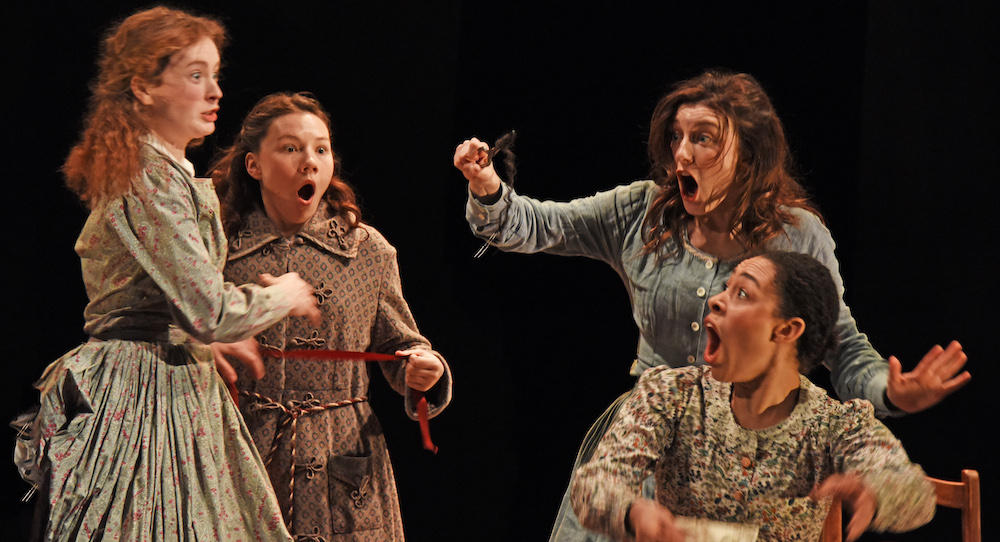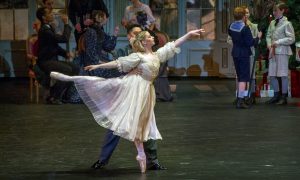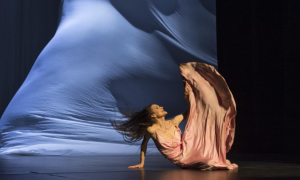Richmond Theatre, London.
4 June 2025.
Little Women was presented by Lee Dean and Daniel Schumann, in association with Pitlochry Festival Theatre, The Belgrade Coventry and Blackpool Grand Theatre.
A predominantly female audience gathers this evening in this beautifully ornate Grade II listed theatre. An open stage depicting the March’s family home, with a dining table, chaise longue, and a piano ignites anticipation before this adaptation of Louisa May Alcott’s classic novel begins.
Glory, glory, Hallelujah! Glory, glory, Hallelujah!
Glory, glory, Hallelujah! His truth is marching on!
The family enter the stage singing in pleasant harmony. Jo sits at her writing desk initially, before spoiling the peace by breaking out into rowdy games and sisterly banter as all the girls’ personalities are firmly asserted. Jo, played by Grace Molony, in particular is immediately relatable, with her frank and outspoken views. So freely and enviably unapologetic.
In spite of the classic fiction having been written in 1868, the themes run deep and still have striking relevance to modern issues; growing up, relationship struggles, and societal expectation. In fact Marmee, played tonight by Ellie Pawsey, advises her youngest two children to stay children for as long as possible. The humour present in the dialogue is attractively enhanced visually through interactions, nudges, winks and eyerolls. The spontaneous singing works so naturally as part of the drama and assists with seamless scene changes, too.
Aunt March, played by Belinda Lang, has quite a strained voice this evening, though her deliverance of numerous humorous lines is entertaining. Laurie – Cillian Lenaghan – the new neighbour and playmate for Jo and her sisters, is flamboyant and expressive. He and Jo have some great playfighting moments. And dancing ones, too – though Jo tries to lead! Lenaghan also plays Laurie’s intoxicated scene well later into the play.
Eldest sister Meg, played by Jade Kennedy, and Jo have some touching scenes together, each delightfully true to their characters as they navigate growing up, albeit with very different outlooks. And a playful interlude between Beth and Amy, soothes Amy’s spoiled jealousy. Imogen Elliott is excellently cast as Amy, and she also has a clear leading singing voice.
Jo’s frank exposure of her own temper is liberating.
“Try not to let the sun go down on your anger.” Marmee advises Jo gently, and she tells her that she deals with her own temper by reminding herself that she is the example for how she wants her children to behave.
Silences are used very effectively in this production. Jo sinking into her writing on one side of the stage and Marmee holding back tears as she sits at the piano on the other side watching Amy sleeping. And again, when the four girls are left alone after a frantic rush to help Marmee prepare to leave to go to her injured husband. The audience has time to feel the emotions settling, or building, on stage.
The lighting and staging also work cleverly, allowing the main set to remain in place throughout each Act, with sections of the stage lit up to depict different places or scenes. Cut outs in the backdrop, allow scenes to take place outside or in other places. The slim trunks of their childhood woodland trees remain staggered, a few on each side of the stage and they double up as entrances, and a window through which Jo and Laurie climb.
Love is of course a huge theme in Little Women, and the audience’s heart strings are tugged as the older sisters begin to learn about different types of love, with Meg coy as she matures and admits her feelings for John, and by contrast Jo’s refusal to be conventional. And when Laurie proposes to her, her bold and mature recognition of the kind of love she feels for him.
Act 2 also has a raised curtain before it commences, allowing the audience a good look at the two towering dark wood filled bookcases set centrally.
Jo works hard with her writing and as a governess in New York Act 2, while we see Amy preparing to be taken off abroad with Aunt March, much to Jo’s devastation.
“My abominable tongue, why can’t I learn to keep it quiet?”
Movement, by Mike Ashcroft, speaks as clearly as the dialogue. From the different interactions between the characters and their body language, to the physical placings and spacings of each scene.
Jo and Frederick already have more than a good friendship developing when she has to return home abruptly as Beth, her youngest sister has fallen sick. A heart to heart between Jo and Beth, reveals much maturity in the youngest sister, played by Catherine Chalk.
“The tide – it goes out slowly, but it can’t be stopped.” She tells Jo as she explains that she knows she is not going to get better. They sit together on the couch, heads bent towards one another. Instead of a traditional death scene, in dimmed lighting, Beth simply gets up and leaves the stage, while Jo stays frozen in the position she was in at their last words. Morning light sees Jo hugging Beth’s doll, distraught.
Marmee is there again with sensible suggestions. She reminds Jo that she is always happiest when she is writing and encourages her to settle at her desk again. Jo writes from her heart and out spills the story of herself and her sisters and their growing up years together. Jo sends the story to Frederick, which on stage is simply a handover as he walks past – though he’s still in New York. It works perfectly.
The book is the catalyst that brings Frederick all the way to Jo. Who in the meantime has had another shock seeing Laurie married to her sister Amy. Snow falls on stage as Jo removes herself from the situation to let the news sink in.
She meets Frederick who is on his way to her. Marmee plays gentle piano music in the background, leading to a perfectly poignant ending. Frederick reveals his love for her but says he only has his heart and his empty hands to offer her. Jo places her hands in his.
“They’re not empty now.”
By Louise Ryrie of Dance Informa.














